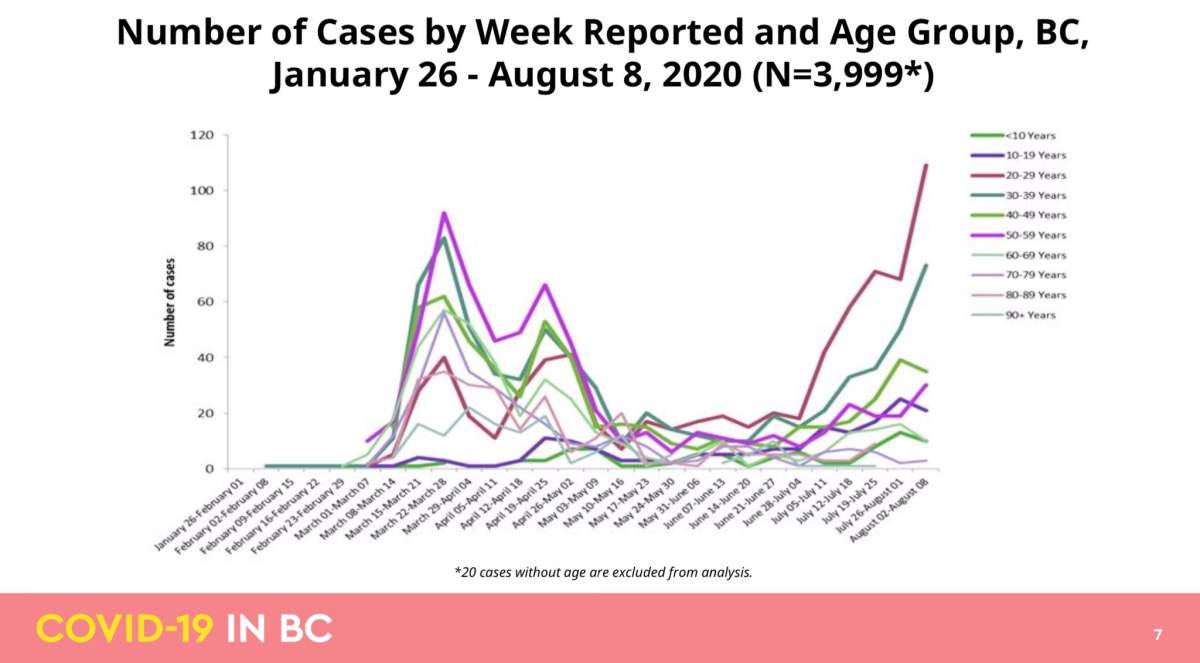While B.C. has been a Canadian leader in its coronavirus response, a Simon Fraser University (SFU) health expert says the province has failed in getting its message to younger people.

It comes as the province sees COVID-19 cases surging, driven largely by social gatherings of younger adults in the Lower Mainland.
SFU health sciences professor Scott Lear believes that’s in part because since the start of the pandemic, B.C.’s messaging has focused on how the virus affects vulnerable people, particularly the elderly or those with chronic illnesses.
“I think the message that we hear is that if you’re young you’re not going to die … so you’re not going to be really at risk,” he told Global News.
“So there doesn’t really seem to be a message that hey, look, everybody needs to be concerned here.”

Yes, COVID-19 affects young people
Lear said communication around COVID-19, both from the government and from the media, has relied heavily on reporting daily statistics.
Tracking those numbers is important, he said, but fails to connect with people on a human level and can become background noise.
It also doesn’t spotlight what happens to people who do get COVID-19, but recover.
“It makes you think oh, you get the virus, and if you don’t die you recover so everything is fine,” he said.

Get daily National news
“A lot of these people will have ongoing issues for months that we’re learning about, fatigue, compromised lung function, as well as issues with the heart perhaps.”

Kyla Lee, a 33-year-old Vancouver lawyer and COVID-19 survivor, says those long term complications are very real.
Lee contracted a “mild” but symptomatic case of the virus in March, and while she has since recovered, the after effects persist.
“I used to be able to go out for a couple hours (with my dog). Now, I get quite fatigued after about 20 minutes of walking,” she said.
“We’ve got to go back to the house and I’ve got to lie down and am basically done for the rest of the day.”
Lee says despite repeated blood tests showing she’s clear of the virus, COVID-19 symptoms have returned several times, often lasting up to 10 days.
“On paper, it looks like I’m incredibly healthy, but I have this 38-degree fever and cough and sore throat,” she said.
“All of these symptoms that the doctors are like, ‘We don’t know.'”
Getting the message across
B.C. health officials have ramped up attempts to communicate with youth in recent weeks, including recruiting social media influencers and creating an online “good times” safety guide.
But Lear says the province needs to step up efforts on several fronts if it hopes to get through.
One way would be by highlighting stories like Lee’s.
“(We need) people in their 20s and their 30s to share how the pandemic has affected them and that brings a real voice as opposed to somebody like me, who’s early 50’s, telling them what they should and shouldn’t do, because in the end, you know, my kids won’t listen to me,” he said.
“I can remember being that age as well, and you know if you’re just shaming and blaming somebody it’s not going to work.”
It’s an approach the federal government has taken, producing videos of young people sharing their experiences with the virus.
Those videos, however, have not attracted wide viewership. The video above, posted in June, has been viewed fewer than 5,000 times.
Lear argues that if those stories are going to get to young people, they need to be posted on platforms the demographic engages with such as Instagram, Tik Tok and other social media.

He says the province also needs to invite youth to the table to help lead the effort to engage their peers.
At his Thursday briefing, Health Minister Adrian Dix said the province was redoubling its efforts with social media influencers with that in mind.
“Part of reaching out to social influencers is to extend the reach of the messages of the we’re putting out and allowing people to put into their own terms the messages that Dr. (Bonnie) Henry has delivered,” he said.
“Part of that message is about private parties, frankly, which have been a significant source of problems,” he added.
Dix said the province also wants individuals to act as influencers on their own social network, and wouldn’t rule out looking at broadening its campaign, including potential advertisements.”
From Lee’s perspective, months into post-COVID complications, the message needs to be tougher: shut down the bars and pubs.
“The approach taken by the government to do very few restrictions and appealing to people’s sense of decency worked for a while, but I think now we can see there is a subset of the population who are people around our age who that’s not working for,” she said.
“Our parents used to punish us where if we were bad, they would take away our privileges. I think at this point we’ve demonstrated that we’re not following the rules and we’re being bad and we need to have our privileges taken away.”
- Musqueam First Nation signs Aboriginal rights deal with Ottawa – read the full agreement
- 3 foreign nationals charged after extortion shootings in B.C. and Alberta
- Worker falls down 6-metre hole at Langley Events Centre construction site
- Father of Tumbler Ridge victim says son returned to Zambia for ‘befitting funeral’










Comments
Want to discuss? Please read our Commenting Policy first.